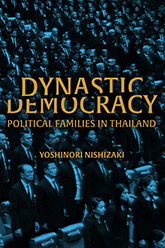|
Dynastic Democracy
Political Families in Thailand
Yoshinori Nishizaki
New Perspectives in Southeast Asian Studies
Alfred W. McCoy, Ian G. Baird, Katherine A. Bowie, and Anne Ruth Hansen, Series Editors
“Unprecedented. . . . As the first book of its kind to construct lineages of Thai political elite families linking past to present, as well as their crucial significance to contemporary Thai politics, this work is an excellent read.”
—Asian Affairs
It’s not simply a struggle against dictatorship—elite families make and unmake dynastic democracy
Since the overthrow of absolute monarchy in 1932, Thailand’s political history has conventionally been interpreted as a long series of popular struggles for representative democracy and against authoritarian military rule. Yoshinori Nishizaki proposes that this history be understood as a continual struggle by elite political families for and against “dynastic democracy”—characterized by the transmission of power between members of select ruling families. Thailand has experienced no fewer than twenty-two coups over the past century, and Nishizaki shows that family-based contests for power underlie that tumultuous politics.
Drawing extensively on Thai-language primary sources, Nishizaki traces the intricate blood and marriage connections among Thailand’s political families. These families fall into two categories: influential commoners who have held parliamentary seats since 1932 and form the core of Thailand’s dynastic democracy; and upper-class citizens who are related to the royal family either by kin or by ideological alignment, and who have repeatedly challenged political transitions with coups and constitutional changes, among other maneuvers. Nishizaki illustrates how a broader democracy in Thailand has been consistently stifled, to the detriment of ordinary citizens. Dynastic Democracy fleshes out a widely acknowledged yet heretofore empirically unsubstantiated facet of Thai political history—that in Thai politics, family matters.
 Yoshinori Nishizaki is an associate professor in the Department of Southeast Asian Studies at the National University of Singapore. He is the author of Political Authority and Provincial Identity in Thailand.
Yoshinori Nishizaki is an associate professor in the Department of Southeast Asian Studies at the National University of Singapore. He is the author of Political Authority and Provincial Identity in Thailand.
Praise
“A monumental achievement in the study of dynastic politics that is worthy of widespread appreciation, consideration and discussion.”
—Journal of the Siam Society
“A grand work of applied theory, expanding a provincial power-structure analysis across the whole Thai nation. . . . Nishizaki has constructed a study here that is unique, highly engaging and that pushes Thai studies forward.”
—Global Asia
“[A] major work that is poised to become an important resource for anyone interested in modern Thai politics. . . . A fascinating book. Nishizaki’s reinterpretation of the entire period of modern Thai political history through a family-based paradigm represents an admirable endeavor to break away from a very limited set of approaches that have long shaped our understanding of Thailand’s political dynamics. His book, in this sense, injects a breath of fresh air into the field of Thai studies.”
—Contemporary Southeast Asia
“Offers an important and illuminating analytical lens through which to understand Thai politics over the past century. . . . Provides an eye-opening refinement of existing understandings of both state power and class relations in Thailand and a fine-grained sociological analysis of dynastic entrenchment and endurance unmatched in studies of South East Asia for its rigour and richness.”
—South East Asia Research
“A smart and engaging study of modern Thai politics that places political families at the center of the action. . . . Provides a valuable corrective to existing scholarship on Thailand that downplays or misunderstands the significance of political families and contributes theoretically to the study of democracy and democratic breakdown. . . . A successful study chock-full of insights.”
—Democracy and Autocracy
“A tour de force. . . . This book should be a critical reference for scholars of Thai politics. The detailed information on kinship networks presented in this book is an invaluable source for understanding the intricate connections of influential families, which are integral to the contemporary Thai political fabric. Yoshinori Nishizaki’s creativity and tenacity in collecting, coding, analysing, and visualising data from various archival sources serve as an excellent example for history, sociology, and political science students who want to conduct similar research in different contexts.”
—Journal of Southeast Asian Studies
“Nishizaki is one of the keenest analysts of Thai politics working today, and Dynastic Democracy just reinforces that opinion. This is a welcome addition to a growing political science and sociology literature on the causes and consequences of political dynasties.”
—Allen Hicken, author of Building Party Systems in Developing Democracies
“This thoroughly researched revisionist study ranging from the 1930s to the present day will be a reference for those interested in Thai politics and political networks for a long time to come.”
—Chris Baker, coauthor of A History of Thailand
Table of Contents
Contents
List of Illustrations
Preface
Abbreviations
1 Family Rule in the Thai Parliament
2 Old Families Die Hard
3 Sprawling Network Monarchy
4 Ironies of Political Reforms
5 The Royalist Regime Out on a Limb
6 Thailand’s Dynastic Democracy in Comparative
Perspective
Notes
Works Cited
Index
|

Larger images
New in Paperback!
February 2025
LC: 2021053055 DS
304 pp. 6 x 9
44 b/w illus., 7 tables
|

